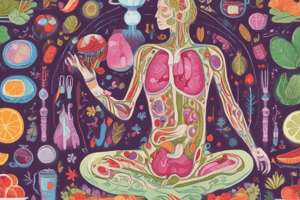Podcast
Questions and Answers
What is the unit of measurement for micronutrients?
What is the unit of measurement for micronutrients?
- Grams
- Liters
- Milligrams (correct)
- Kilograms
What is the term for vitamins that can be stored in the body?
What is the term for vitamins that can be stored in the body?
- Water-soluble
- Electrolytes
- Protein-bound
- Fat-soluble (correct)
What happens if the body lacks vitamins?
What happens if the body lacks vitamins?
- Energy is produced
- A specific deficiency syndrome occurs (correct)
- Toxicity occurs
- No symptoms occur
What is the main reason why vitamins cannot be synthesised by the body?
What is the main reason why vitamins cannot be synthesised by the body?
What are the two main categories of micronutrients?
What are the two main categories of micronutrients?
Why do fat-soluble vitamins not need to be consumed daily?
Why do fat-soluble vitamins not need to be consumed daily?
What is the primary function of Vitamin D in the body?
What is the primary function of Vitamin D in the body?
What is the recommended daily intake of Vitamin D for adult males?
What is the recommended daily intake of Vitamin D for adult males?
Which of the following is a rich source of Vitamin D2?
Which of the following is a rich source of Vitamin D2?
What is the upper level of Vitamin D intake for adults?
What is the upper level of Vitamin D intake for adults?
What is the deficiency disease caused by lack of Vitamin D in children?
What is the deficiency disease caused by lack of Vitamin D in children?
What is the function of Vitamin E in the body?
What is the function of Vitamin E in the body?
What is one of the functions of Vitamin B6 in the body?
What is one of the functions of Vitamin B6 in the body?
Which of the following food sources is richest in Vitamin B9?
Which of the following food sources is richest in Vitamin B9?
What is a consequence of a Vitamin B9 deficiency?
What is a consequence of a Vitamin B9 deficiency?
What is the recommended daily intake of Vitamin B12 for adults?
What is the recommended daily intake of Vitamin B12 for adults?
Who is most at risk of Vitamin B12 deficiency?
Who is most at risk of Vitamin B12 deficiency?
Which of the following is a source of Vitamin B6?
Which of the following is a source of Vitamin B6?
What is the primary function of calcium in the body?
What is the primary function of calcium in the body?
What is the result of a diet low in calcium?
What is the result of a diet low in calcium?
Where is the majority of calcium stored in the body?
Where is the majority of calcium stored in the body?
What is the name of the condition that results from a deficiency in a particular mineral?
What is the name of the condition that results from a deficiency in a particular mineral?
What is the role of hormones such as vitamin D in regulating calcium levels?
What is the role of hormones such as vitamin D in regulating calcium levels?
Which of the following foods is a good source of calcium?
Which of the following foods is a good source of calcium?
What is the recommended daily intake of calcium for children?
What is the recommended daily intake of calcium for children?
What is one of the manifestations of hypocalcaemia?
What is one of the manifestations of hypocalcaemia?
What is the function of iron in the body?
What is the function of iron in the body?
What is the most bioavailable form of iron?
What is the most bioavailable form of iron?
What can inhibit the absorption of non-heme iron?
What can inhibit the absorption of non-heme iron?
What is one of the consequences of low blood potassium levels?
What is one of the consequences of low blood potassium levels?
Flashcards are hidden until you start studying
Study Notes
Micronutrients
- Micronutrients are required in tiny amounts for various bodily processes, but do not provide energy.
- There are two main groups of micronutrients: vitamins and minerals, measured in milligrams (mg).
Vitamins
- Vitamins are required in small amounts for essential processes in the body.
- The absence or underutilization of vitamins causes specific deficiency syndromes.
- Excess amounts of some vitamins may cause toxicity.
- Vitamins are grouped into fat-soluble and water-soluble vitamins.
Fat-Soluble Vitamins
- Fat-soluble vitamins can be stored in the body and include vitamins A, D, E, and K.
- These vitamins are not required daily, as the body can build up stores in the liver and fatty tissues for future use.
- Sources: fatty foods and animal products.
Vitamin D
- Vitamin D is necessary for:
- Calcium and phosphorus absorption and utilization
- Normal blood calcium levels
- Maintaining normal bones and teeth
- Normal muscle function
- Immune system function
- Vitamin D is obtained in two forms: ergocalciferol (vitamin D2) from plant sources and cholecalciferol (vitamin D3) from sunlight.
- Sources: meat, egg yolks, liver, fatty fish, and fortified milk.
- Deficiency: Rickets in children, osteomalacia in adults.
- Toxicity: Hypervitaminosis D, leading to anorexia, nausea, vomiting, and bone aches.
Vitamin E
- Vitamin E is an antioxidant that protects cells against oxidative damage.
- Sources: unsaturated fatty acids, e.g., plant oils such as sunflower, corn, and olive oils.
Vitamin B6
- Functions:
- Metabolism of amino acids
- Breaking down glycogen
- Modification of steroid hormone action
- Formation of red blood cells and metabolism and transport of iron
- Maintenance of normal blood homocysteine levels
- Sources: poultry, white fish, milk, eggs, whole grains, soya beans, and peanuts.
- Deficiency: Rare, but may occur as a complication of disease or prolonged administration of certain drugs.
Vitamin B9 (Folate/Folic Acid)
- Sources: green leafy vegetables, brown rice, peas, orange, bananas, and fortified breakfast cereals.
- Deficiency: Results in neural tube defects in newborns and megaloblastic anemia.
Vitamin B12 (Cyanocobalamin)
- Functions:
- Normal formation of red blood cells
- Normal immune system and nervous system function
- Energy production
- Sources: Found in almost all foods of animal origin, including meat, fish, milk, cheese, eggs, yeast extract, and fortified breakfast cereals.
- Deficiency: Rare in younger people, more common in older people due to impaired absorption, resulting in pernicious anemia.
Minerals
- The body requires minerals in small amounts for various functions.
- Each mineral has a specific function and is required in different amounts.
Calcium
- Functions:
- Development and maintenance of healthy bones and teeth
- Normal muscle contraction (including the heart)
- Normal blood clotting
- Calcium levels in the blood are regulated by hormones like vitamin D.
- Sources: dairy products, green leafy vegetables, fortified soya products, and fish eaten with the bones (e.g., sardines).
- Deficiency: Low bone density, leading to osteoporosis.
Iron
- Functions:
- Formation of hemoglobin in red blood cells
- Binding of oxygen and transporting it around the body
- Immune system function
- Normal energy metabolism
- Metabolism of drugs and foreign substances
- Sources: Haem iron (from animal sources) and non-haem iron (from plant sources).
- Lack of iron may lead to iron deficiency anemia.
- Vitamin C helps absorb non-heme iron when eaten at the same time.
Potassium
- Functions:
- Normal functioning of the nervous system
- Normal muscle function
- Maintaining normal blood pressure
- Sources: fruit and vegetables (especially bananas), meat, fish, shellfish, nuts, seeds, pulses, and milk.
- Low blood potassium levels: severe diarrhea, weakness, mental confusion, and, if extreme, heart failure.
Studying That Suits You
Use AI to generate personalized quizzes and flashcards to suit your learning preferences.




